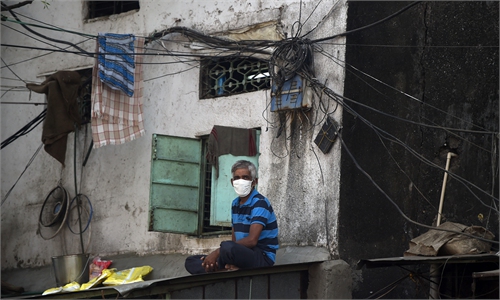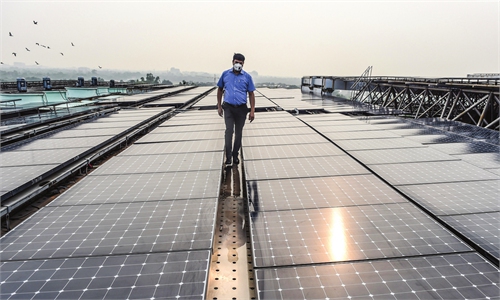COMMENTS / EXPERT ASSESSMENT
Apple supplier’s challenges deal fresh blow to ‘Make in India’

Illustration: Tang Tengfei/GT
The Indian government's efforts to woo international companies to relocate their production to the South Asian country, amid the US' political maneuver to split the global industrial chain and the COVID-19 pandemic's interruption to global supply chain, have recently encountered more roadblocks.
While many Indian media outlets reported on Wednesday that Apple is set to begin production of iPhone 13s in India from February, Reuters reported on the same day that Apple supplier Foxconn's plant near Chennai in southern India will remain shut this week following protests sparked by a food poisoning incident.
The production suspension due to protests is the second such incident involving an Apple supplier factory in India within a year. In December 2020, thousands of contract workers at a factory owned by Wistron Corp destroyed equipment and vehicles, causing a damage estimated at $60 million, according to Reuters.
In recent years, development of the mobile phone industry in India is far ahead other industries. The problems that the industry is encountering are the epitome of the plight of India's entire manufacturing sector, and it also fully highlights the problems that are restricting India's manufacturing.
Since Indian Prime Minister Narendra Modi raised the "Make in India" initiative aimed at revitalizing the Indian manufacturing industry in 2014, the share of manufacturing in India's GDP had fallen from 15 percent in 2014 to 14 percent in 2019. Most manufacturing industries have seen little growth. Only the mobile phone industry has achieved notable gains.
India's huge market potential, coupled with specialized industrial policies such as the Phase Manufacturing Programme (PMP) and Modified Special Incentive Package Scheme (M-SIPS), have made India the world's second largest mobile phone manufacturer. However, it must be pointed out that India's proud mobile phone manufacturing industry is inseparable from Chinese investment and technology. Before the pandemic, of the 158 million units shipped in the Indian market in 2019, about 114 million were Chinese brands, with Xiaomi, vivo, and Oppo leading the pack.
However, since the pandemic, facing the re-adjustment of the global industrial chain and the US' decoupling agenda, the Indian government believes that the country has a great opportunity to lure companies away from China. At the same time, India's domestic anti-China forces also used border incidents to incite nationalist sentiments to boycott Chinese products and brands. Indian officials have implemented a series of discriminatory restrictive measures such as ban against Chinese apps.
But what India did not expect is that the pandemic has turned out to be more of a crisis than an opportunity for the country's manufacturing sector. The setbacks experienced within India's mobile phone industry during the pandemic show that it is not easy for India to catch up with Chinese manufacturing, let alone to replace Chinese manufacturing.
As the "Delta wave" dominated the second surge of COVID-19 infections earlier this year in India, production of the iPhone 12 at a Foxconn factory in India slumped by more than 50 percent with workers infected with COVID-19 having to leave their posts, Reuters reported in May.
The problems highlighted by the Indian mobile phone manufacturing industry during the pandemic, including the structural problems faced by the Indian economy, can't be resolved by its current approach of antagonizing China.
Since the pandemic, India has not shown any willingness to cooperate with China in economic and trade, while moving closer and closer to the US. However, facing its own crises at home, the US won't offer much help to India.
If India wants to boost the manufacturing industry, it needs to address issues in domestic infrastructure, business environment, and labor resources, rather than allowing geopolitical calculations to override its economic policies.
Simply put, India won't shake China's status as a global manufacturing center. Taking the Indian mobile phone industry as an example, about 75 percent to 78 percent of parts and components are imported from China. With such a heavy dependence on China, it is unwise and unrealistic for the Modi administration to pursue a decoupling approach.
The author is a reporter with the Global Times. bizopinion@globaltimes.com.cn



